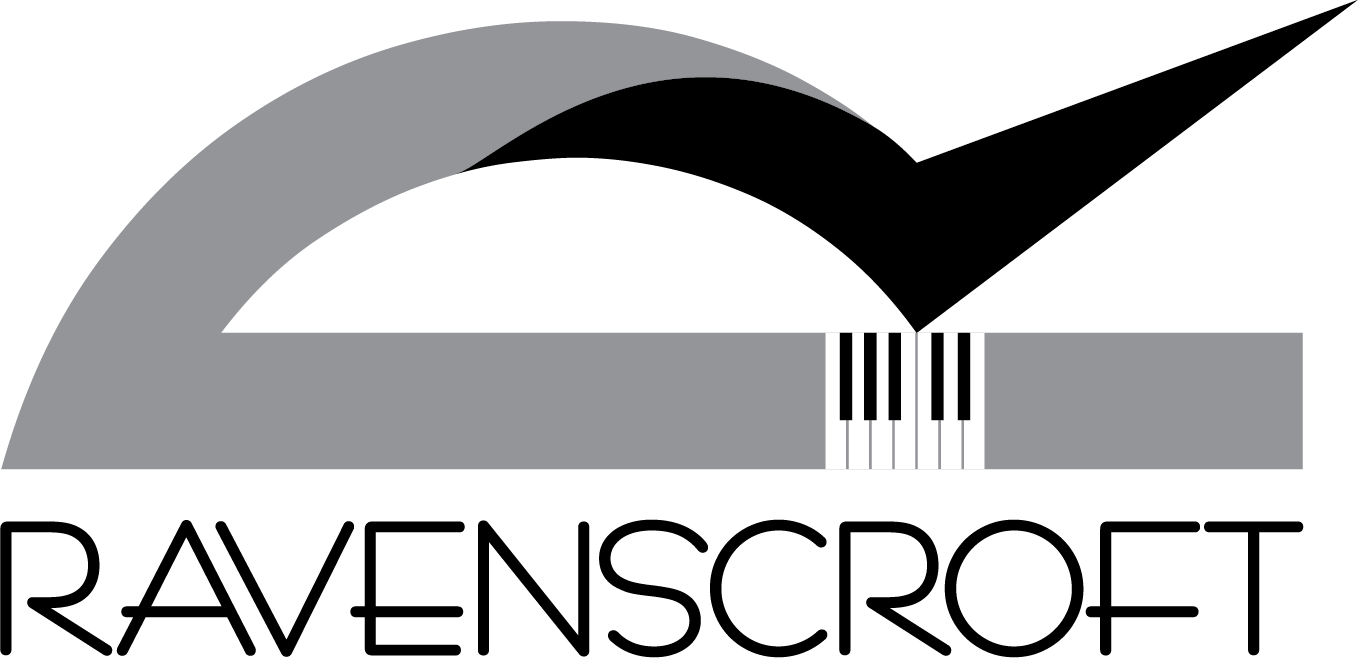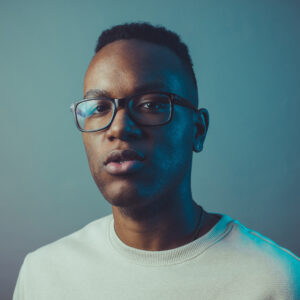Ravenscroft Jazz Prize
The Ravenscroft Jazz Prize seeks to recognize and elevate young, American solo artists as they begin their journeys in improvised music. The inherently spontaneous nature of jazz allows musicians the freedom to explore and create. And this music provides a wonderful platform through which they can inspire others, even as they themselves are finding inspiration in performance.
In order to participate in the Ravenscroft Jazz Prize competition, the entrant must fall into the specific age ranges stated below. It is the intent of the Ravenscroft Jazz Prize who are best able to use improvisation to connect with audiences at a deeper, more meaningful level.
Congratulations to our 2024 Prizewinners!
For Developing Musicians (ages 16-19)
- 1st place - Elena Weng
- 2nd place - Nick Mikhail
- 3rd place - Tanvi Kumar
For Early Professional Artists (ages 20-23)
- 1st place - Aviana Gedler
- 2nd place - Kate Kortum
- 3rd place - Faith Quashie
General Info
The Ravenscroft Jazz Prize is an online jazz performance competition divided into two main categories, with eligibility determined by age, open to jazz instrumentalists and vocalists as follows:
1) Developing Musicians (ages 16-19)
- Open to jazz instrumentalists in 2024
- Next open to jazz vocalists in 2025
2) Early Professional Artists (ages 20-23)
- Open to jazz vocalists in 2024
- Next open to jazz instrumentalists in 2025
Eligibility to participate in the Ravenscroft Jazz Prize is limited to citizens of the United States, the District of Columbia, and U.S. commonwealths/territories. (U.S. nationals from American Samoa are also eligible to participate.)
Adjudicators
RJP Developing Musicians Category 2024
Roxy Coss
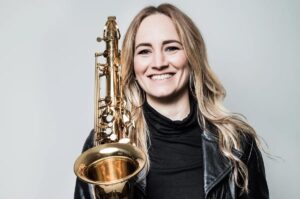 Musician, Composer, Bandleader, Educator and Activist Roxy Coss received the 2022 Downbeat Critics’ Poll "Rising Star" award on Soprano Saxophone, is a recipient of the ASCAP Young Jazz Composer Award, the Hothouse Magazine & Jazzmobile “Tenor Saxophone” Award, and is a Jazziz Magazine “Artist to Watch”. She has performed around the world, headlining at the Newport Jazz Festival, Melbourne Big Band Festival, NYC Winter JazzFest, BRIC JazzFest, Earshot Jazz Festival, San Jose Jazz Summerfest, Jazz Standard, and Jazz Showcase. Coss has performed as a side musician with Jazz greats and luminaries including Clark Terry, Billy Kaye, Maurice Hines, Rufus Reid, Louis Hayes, Gene Perla, Houston Person, Claudio Roditi, Bill Charlap, Geoffrey Keezer, Willie Jones III, Jeremy Pelt, Darcy James Argue, the DIVA Jazz Orchestra.
Musician, Composer, Bandleader, Educator and Activist Roxy Coss received the 2022 Downbeat Critics’ Poll "Rising Star" award on Soprano Saxophone, is a recipient of the ASCAP Young Jazz Composer Award, the Hothouse Magazine & Jazzmobile “Tenor Saxophone” Award, and is a Jazziz Magazine “Artist to Watch”. She has performed around the world, headlining at the Newport Jazz Festival, Melbourne Big Band Festival, NYC Winter JazzFest, BRIC JazzFest, Earshot Jazz Festival, San Jose Jazz Summerfest, Jazz Standard, and Jazz Showcase. Coss has performed as a side musician with Jazz greats and luminaries including Clark Terry, Billy Kaye, Maurice Hines, Rufus Reid, Louis Hayes, Gene Perla, Houston Person, Claudio Roditi, Bill Charlap, Geoffrey Keezer, Willie Jones III, Jeremy Pelt, Darcy James Argue, the DIVA Jazz Orchestra.
Roxy has six albums out under her own name, including her latest release, Disparate Parts (Outside in Music), which was met with critical acclaim. Her fifth album Quintet (Outside in Music), received a 4-Star review from Downbeat. The Roxy Coss Quintet, featuring some of the world’s finest young musicians, is the first-ever recipient of the Emerging Artist Project, a four-year grant from the Local 802 Musicians Union. They largely perform Coss’ original compositions. Her composition work can also be found on Jeremy Pelt’s recording, Face Forward, Jeremy (High Note).
Coss grew up in Seattle, WA where she attended the acclaimed Garfield High School Jazz Ensemble, and graduated from William Paterson University in 2008 with a BM in Jazz Studies/Performance. She has been living in the New York area since 2004. Roxy currently serves on the Board of Directors for the Jazz Education Network (JEN), is Jazz Faculty at The Juilliard School, and is the President & Founder of Women In Jazz Organization (WIJO). She is also an endorsing Artist for P. Mauriat, Vandoren, and Key Leaves products.
Jason Palmer
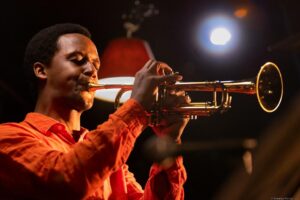 Jason Palmer is one of the most in demand musicians of his generation. He has performed with Roy Haynes, Herbie Hancock, Jimmy Smith (the organist), Wynton Marsalis and the Lincoln Center Jazz Orchestra, Kurt Rosenwinkel, Ravi Coltrane, Mark Turner, Jeff Ballard, Lee Konitz, Phil Woods, Common, Roy Hargrove, Lewis Nash.
Jason Palmer is one of the most in demand musicians of his generation. He has performed with Roy Haynes, Herbie Hancock, Jimmy Smith (the organist), Wynton Marsalis and the Lincoln Center Jazz Orchestra, Kurt Rosenwinkel, Ravi Coltrane, Mark Turner, Jeff Ballard, Lee Konitz, Phil Woods, Common, Roy Hargrove, Lewis Nash.
In addition to performing on over forty albums as a sideman, Jason has recorded thirteen albums under his own name on labels Ayva, Steeplechase, Newvelle, and most recently with Giant Step Arts. Four of his recordings were reviewed by Downbeat Magazine, all receiving 4 stars or better. Jason has toured in over 30 countries with saxophonists Mark Turner, Greg Osby, Grace Kelly, and Matana Roberts, and has been a featured guest artist on multiple projects in Portugal, Mexico, Canada and Russia.
For the past fifteen years, Jason's quintet has maintained a residency as the house band every weekend at Boston's historic Wally's Jazz Café. He has presented his band at numerous clubs throughout the northeast United States including the Tanglewood Jazz Fest, Sculler's Jazz Club, the Stone in NYC, the Jazz Gallery in NYC, and the Beantown Jazz Festival.
In addition to a heavy performing schedule, Jason Palmer offers his passion for improvised music as a full-time Assistant Professor of Ensembles and Brass at Berklee College of Music and as a board member at JazzBoston. Jason has also served as an Assistant Professor at Harvard University and at New England Conservatory. He has held teaching residencies at ASU and served on the faculty at the New School of Jazz and Contemporary Music in New York City. Mr. Palmer has given master classes in Boston MA, Washington D.C., New York City, Indiana, Kentucky, Texas, Arizona, California, Idaho, Montana, Alaska, Portugal, France, the UK, Russia, Canada, and Mexico.
Corcoran Holt
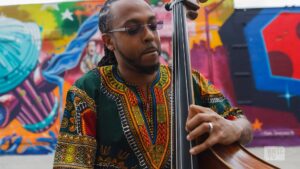 Corcoran Holt began his study of upright bass at the age of 10 with the renowned DC Youth Orchestra (DCYOP). Corcoran attended the prestigious Duke Ellington School of the Arts in Washington DC from 1996 to 2000, where he studied classical bass with Carolyn Kellock and jazz music with educators Davey Yarborough, the late great Keter Betts and Steve Novasel. During these high school years, Corcoran realized his affinity for the jazz and honed his performance skills by working frequently on the Washington DC jazz scene.
Corcoran Holt began his study of upright bass at the age of 10 with the renowned DC Youth Orchestra (DCYOP). Corcoran attended the prestigious Duke Ellington School of the Arts in Washington DC from 1996 to 2000, where he studied classical bass with Carolyn Kellock and jazz music with educators Davey Yarborough, the late great Keter Betts and Steve Novasel. During these high school years, Corcoran realized his affinity for the jazz and honed his performance skills by working frequently on the Washington DC jazz scene.
Always performing, he completed a Bachelors of Arts in Jazz Studies from Shenandoah Conservatory in 2004, where he studied bass with Michael Bowie. He received his Masters degree in Jazz Studies from Queens College in New York City in 2006 under the tutelage of Buster Williams, Michael Phillip Mossman, and Antonio Hart.
Corcoran has worked with dozens of jazz legends including Curtis Fuller, Benny Golson, Jimmy Cob, Roy Hargrove, Mulgrew Miller, and Jimmy Heath to name a few. He also shares the stage with contemporary jazz masters like Kenny Garrett, Terell Stafford, Wycliffe Gordon, and Benny Green amongst others.
Corcoran performs regularly at many of the top music festivals and venues around the world. Some have included The North Sea Jazz Festival, Monterey Jazz Festival, Newport Jazz Festival, The Village Vanguard, The Blue Note, Dizzy's Club Coca Cola to name a few. Corcoran has performed through North, Central and South America, Europe, Asia, Africa, and the Caribbean. In 2009, he toured the Middle East as a Jazz Ambassador representing the United States, under the US State Department with Alvin Atkinson & the Sound Merchants. In September 2010, he traveled part of The Rhythm Roads tour with Nasar Abadey and Supernova to East Africa, a collaboration between the U.S. State Department and Jazz at the Lincoln Center.
RJP Early Professional Artists Category 2024
Michael Mayo
Born and raised in L.A., but a diehard New Yorker for the past five years (drawn by “the music, art and energy, its motivating factor”), 28-year-old Michael Mayo finished work on his debut solo album Bones, on the Artistry Music/Mack Avenue Music Group.
The son of “first-call” session and touring musicians, Michael’s dad Scott Mayo was a saxophonist for Earth, Wind & Fire, among many others, and is currently the musical director for Sergio Mendes, while his mom Valerie Pinkston, now a back-up vocalist for Diana Ross, also sang with Beyoncé, Luther Vandross, Ray Charles, Whitney Houston and even alt icon Morrissey.
Bones is Mayo’s first full-length album under his own name after studying at the prestigious New England Conservatory of Music and the Thelonious Monk Institute — now named after Herbie Hancock, who mentored Mayo, helping him discover the link between sound and technology through a looper pedal, and showcased him as a featured vocalist on a tour of South America in 2018.
Like Bobby McFerrin, one of his major influences (who was a graduate of the same L.A. performing arts high school), Mayo approaches his voice as a musical instrument, but in often unexpected ways — with Brian Wilson-style pop harmonies, Stevie Wonder R&B, drum and bass, and even hip-hop. Even with his classical training, Mayo’s music is a seamless blend of alternative and neo-soul elements, a unique combination that defies genre.
“I’ve known since I was a toddler that I wanted to be a singer and tour the world,” says Mayo. “I thought my parents’ job was amazing and something I could do. In the end, though, session work didn’t fill me with the kind of satisfaction that creating my own music does, being able to share a more personal statement, rather than support someone else’s vision.”
“For me, the goal has always been to make music, travel the world and meet interesting people,” says Mayo. “Living a passionate life.”
Sara Gazarek
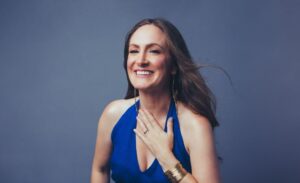 Born and raised in Seattle, WA, 3x GRAMMY® nominated jazz vocalist Sara Gazarek reigns as one of the most creative voices of her generation, and one “who may well turn out to be the next important jazz singer” (Los Angeles Times). Collaborating with jazz legends Fred Hersch, Billy Childs, Kurt Elling, and more, and with 6 critically-acclaimed albums under her belt at the age of 40, Gazarek often tours internationally as a soloist/band leader, and as a co-founder of the vocal collective, säje, whose debut single earned a 2021 GRAMMY® nomination. Sara works as an Associate Professor of Jazz Voice at the Eastman School of Music (University of Rochester) where she is currently working to build their brand new jazz voice degree, set to launch in Fall of 2024.
Born and raised in Seattle, WA, 3x GRAMMY® nominated jazz vocalist Sara Gazarek reigns as one of the most creative voices of her generation, and one “who may well turn out to be the next important jazz singer” (Los Angeles Times). Collaborating with jazz legends Fred Hersch, Billy Childs, Kurt Elling, and more, and with 6 critically-acclaimed albums under her belt at the age of 40, Gazarek often tours internationally as a soloist/band leader, and as a co-founder of the vocal collective, säje, whose debut single earned a 2021 GRAMMY® nomination. Sara works as an Associate Professor of Jazz Voice at the Eastman School of Music (University of Rochester) where she is currently working to build their brand new jazz voice degree, set to launch in Fall of 2024.
Gazarek attended the University of Southern California, where she studied with bassist-arranger John Clayton and vocalist Tierney Sutton, and won a Downbeat student music award in 2003. Just a few years later, at all of 23 years old, she recorded her debut album, Yours, followed by a two-month nationwide tour. Gazarek’s subsequent studio albums – Return to You (2007), Blossom & Bee (2012), and Dream in the Blue (2016) – continued to earn critical raves and cement her reputation as an important young jazz voice.
Based in Los Angeles, Gazarek often tours internationally as a soloist/band leader, and as a co-founder of the vocal collective, säje, whose debut single earned a 2021 GRAMMY® nomination. Sara is a 2023 Chamber Music of America New Jazz Works grant recipient, serves on the LA Chapter Board of Governors for the Recording Academy, and works as an Associate Professor of Jazz Voice at the Eastman School of Music (University of Rochester) where she currently working to build their brand new jazz voice degree, set to launch in Fall of 2024.
Tommy Boynton
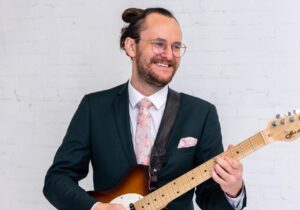 Tommy Boynton is a jazz singer, composer, and multi-instrumentalist residing in St Paul, Minnesota. His musical journey began in Aurora, Colorado where he sang in children’s choirs, and studied piano and drumset. Community has always been an enormous part of Tommy’s life, and the communities that music provided made a lasting impression on him that encouraged his pursuit of music. He attended the School for Music Vocations at Southwestern Community College in Creston, Iowa where he studied jazz voice, classical and jazz piano, composition and arranging, and studio engineering. This two-year program led him to complete his studies in Boston at The New England Conservatory of Music where he studied jazz voice with Dominique Eade, Ran Blake, and Fred Hersch.
Tommy Boynton is a jazz singer, composer, and multi-instrumentalist residing in St Paul, Minnesota. His musical journey began in Aurora, Colorado where he sang in children’s choirs, and studied piano and drumset. Community has always been an enormous part of Tommy’s life, and the communities that music provided made a lasting impression on him that encouraged his pursuit of music. He attended the School for Music Vocations at Southwestern Community College in Creston, Iowa where he studied jazz voice, classical and jazz piano, composition and arranging, and studio engineering. This two-year program led him to complete his studies in Boston at The New England Conservatory of Music where he studied jazz voice with Dominique Eade, Ran Blake, and Fred Hersch.
Since graduating from NEC in 2012, Tommy has been an active collaborator in the Midwest music scene, and an international touring musician with The Four Freshmen, The Mimzees, Fred Hersch, The River Monks, Extravision, Field Division, and more. With The Four Freshmen, Tommy has performed at some of the worlds premiere jazz clubs and music festivals including the Cotton Club in Tokyo, the Blue Note in Beijing, the Dirty Dog Jazz Cafe, Live at Emmets Place, Oslo Jazz Festival, Detroit Jazz Festival. He has had the opportunity to play with The Phat Band, Glenn Miller Orchestra, Tex Benecke Orchestra, and record with Emmet Cohen, Russell Hall, Kyle Poole, Butch Miles, Ken Peplowski, Katie Thiroux, and more. After teaching for five years, he recently stepped away from his position at the School for Music Vocations to step back into his community and touring.
As an artist and educator, Tommy is grateful for the paths that have allowed him to stay actively creative and exploring while seeking to welcome all in experiencing and enjoying music free of judgment and shame.
Application Info (ages 16-19)
Eligible performers in the Developing Musicians (ages 16-19) category can submit only one application to the competition each year, so multi-instrumentalists may not submit multiple applications (on different instruments) at the same time.
- The age ranges cited above refer to one's age on June 15th, which marks the beginning of each Ravenscroft Jazz Prize's application cycle. For clarity’s sake, the application window for each administration of the Ravenscroft Jazz Prize begins on June 15th and closes no later than September 1st. However, the application window may close earlier if application limits (articulated below) are reached before that closing date.
- Applicants must complete an online application (found below), including submission of a non-refundable $30 (USD) application fee. Upon receipt of the completed online application and fee, applicants will receive a confirmation email, which will also detail where and how to upload their two video submissions for the Ravenscroft Jazz Prize.
- In this category, the application window will close after the first 80 applications are received from jazz instrumentalists (2024, 2026, etc.) or after the first 40 applications are received from jazz vocalists (2025, 2027, etc.). An application is considered received once the online form has been completed and the application fee has been submitted.
- The videos uploaded to YouTube for consideration should feature the applicant performing two selections of their choice. Repertoire may be drawn from American songbook standards (Berlin, Gershwin, Porter, Rodgers, etc.) or original jazz classics (Ellington, Monk, Rollins, Silver, etc.) and the two selections should have some element of contrasting styles/tempos between them. Each of the two videos uploaded should be approximately five minutes in length; the two videos taken together should not exceed ten minutes in length.
The applicant should be the most prominent performer on the videos. It is strongly encouraged, though not required, that applicants video-record themselves playing live with one or more other musicians or performing unaccompanied (as with solo guitar or solo piano), as opposed to playing along with pre-recorded accompanimental tracks.
- Regarding the content and production of any video submitted to this competition, there are three important recommendations to consider. First, videos should focus on effectively presenting the applicant’s performance of the music. There is no advantage to be gained with adjudicators by creating videos featuring state of the art cinematography, lighting, editing, post-production, etc. We are recognizing artistic endeavor by creative musicians, so please make certain the audio track for the video reflects a focus on quality. Cell phone videos may be sufficient to achieve one’s goals, so long as the audio component provides a clear representation of the musical performance. Ultimately, the video should be about the music, not the vast visual representations of the music that are possible.
Secondly, in addition to providing that clear representation of the musical performance, the audio should also provide an honest and transparent one. Advanced audio post-production techniques such as pitch correction should not be utilized in any video submission.
Finally, the adjudication panels for this competition will most value performances that truly feel inspired, that resonate with listeners and fellow performers in deeply emotional and/or spiritual ways. For the purposes of this competition, to submit a video that exhibits the ephemeral, ineffable connection that many great performances possess is far more valued than submitting a recording in which impressive, bravura technique is found in abundance, but used in ways that do not consistently serve the music.
- After the close of the application window, an esteemed panel of adjudicators and jazz artists will evaluate and score all videos. Prizewinners will be announced no later than November 1st. Prizewinners will be required to submit a more official proof of age eligibility than was required in the initial application (such as a photograph of one’s birth certificate, driver’s license, or passport). Upon receipt of that verification, a check will be mailed out to the Prizewinner.
- As part of the agreement to enter the competition, all participants consent to providing Ravenscroft the unrestricted right to repost videos submitted as a means of promoting the Ravenscroft Jazz Prize and its outstanding participants. If an entrant is under the age of majority, a parent or legal guardian shall act on their behalf at the time of application, agreeing to providing Ravenscroft this right.
Application Info (ages 20-23)
- Eligible performers in the Early Professional Artists (ages 20-23) category can submit only one application to the competition each year, so multi-instrumentalists may not submit multiple applications (on different instruments) at the same time. Please note that any former Finalists in the Bob Ravenscroft International Jazz Piano Competition who remain age eligible for this competition are ineligible to apply for the Ravenscroft Jazz Prize.
- The age ranges cited above refer to one's age on June 15th, which marks the beginning of each Ravenscroft Jazz Prize's application cycle. For clarity’s sake, the application window for each administration of the Ravenscroft Jazz Prize begins on June 15th and closes no later than September 1st. However, the application window may close earlier if application limits (articulated below) are reached before that closing date.
- Applicants must complete an online application (found below), including submission of a non-refundable $30 (USD) application fee. Upon receipt of the completed online application and fee, applicants will receive a confirmation email, which will also detail where and how to upload their two video submissions for the Ravenscroft Jazz Prize.
- In this category, the application window will close after the first 80 applications are received from jazz instrumentalists (2025, 2027, etc.) or after the first 40 applications are received from jazz vocalists (2024, 2026, etc.). An application is considered received once the online form has been completed and the application fee has been submitted.
- The videos uploaded to YouTube for consideration should feature the applicant performing two selections of their choice. Repertoire may be drawn from American songbook standards (Berlin, Gershwin, Porter, Rodgers, etc.) or original jazz classics (Ellington, Monk, Rollins, Silver, etc.) and the two selections should have some element of contrasting styles/tempos between them. Each of the two videos uploaded should be approximately five minutes in length; the two videos taken together should not exceed ten minutes in length.
The applicant should be the most prominent performer on the videos. It is strongly encouraged, though not required, that applicants video-record themselves playing live with one or more other musicians or performing unaccompanied (as with solo guitar or solo piano), as opposed to playing along with pre-recorded accompanimental tracks.
- Regarding the content and production of any video submitted to this competition, there are three important recommendations to consider. First, videos should focus on effectively presenting the applicant’s performance of the music. There is no advantage to be gained with adjudicators by creating videos featuring state of the art cinematography, lighting, editing, post-production, etc. We are recognizing artistic endeavor by creative musicians, so please make certain the audio track for the video reflects a focus on quality. Cell phone videos may be sufficient to achieve one’s goals, so long as the audio component provides a clear representation of the musical performance. Ultimately, the video should be about the music, not the vast visual representations of the music that are possible.
Secondly, in addition to providing that clear representation of the musical performance, the audio should also provide an honest and transparent one. Advanced audio post-production techniques such as pitch correction should not be utilized in any video submission.
Finally, the adjudication panels for this competition will most value performances that truly feel inspired, that resonate with listeners and fellow performers in deeply emotional and/or spiritual ways. For the purposes of this competition, to submit a video that exhibits the ephemeral, ineffable connection that many great performances possess is far more valued than submitting a recording in which impressive, bravura technique is found in abundance, but used in ways that do not consistently serve the music.
- After the close of the application window, an esteemed panel of adjudicators and jazz artists will evaluate and score all videos. Prizewinners will be announced no later than November 1st. Prizewinners will be required to submit a more official proof of age eligibility than was required in the initial application (such as a photograph of one’s birth certificate, driver’s license, or passport). Upon receipt of that verification, a check will be mailed out to the Prizewinner.
- As part of the agreement to enter the competition, all participants shall provide Ravenscroft the right to repost any video submitted as a means of promoting the Ravenscroft Jazz Prize, as well as highlighting some of its outstanding participants.
- As part of the agreement to enter the competition, all participants consent to providing Ravenscroft the unrestricted right to repost videos submitted as a means of promoting the Ravenscroft Jazz Prize and its outstanding participants.
Previous Prizewinners
2024 Ravenscroft Jazz Prizewinners
Developing Musicians (instrumentalists)
1st Place – Elena Weng (CA)
2nd Place – Nick Mikhail (NJ)
3rd Place – Tanvi Kumar (CA)
Early Professional Artists (vocalists)
1st Place – Aviana Gedler (MA)
2nd Place – Kate Kortum (NY)
3rd Place – Faith Quashie (NY)
2023 Ravenscroft Jazz Prizewinners
Developing Musicians (vocalists)
1st Place – Dystince Robertson (WI)
2nd Place – Damien Blair (WI)
3rd Place – Natalia Scott (AZ)
Early Professional Artists (instrumentalists)
1st Place – Cameron Campbell (NY)
2nd Place – Arsen Nalbandian (AZ)
3rd Place – Danny Morissett (AZ)
Bob Ravenscroft, the visionary namesake for this competition, is an accomplished jazz pianist, composer, recording artist, and teacher. He has performed and recorded for decades as a solo artist and in piano trio settings, often with his improvisational collective, Inner Journeys. In 2004, Bob founded Music Serving the Word (a.k.a. MSW Ministries), a 501 (c)(3) non-profit private foundation. Through MSW, he continues to create and encourage others to discover new and innovative ways for music to transcend mere performance and truly serve the living Word. (John 1:1)
The Ravenscroft Jazz Prize is administered by Ravenscroft, a 30,000 square foot music venue and multi-use space in Scottsdale, AZ, which opened in October 2021 as an outreach of MSW to serve both spiritual and artistic communities.
